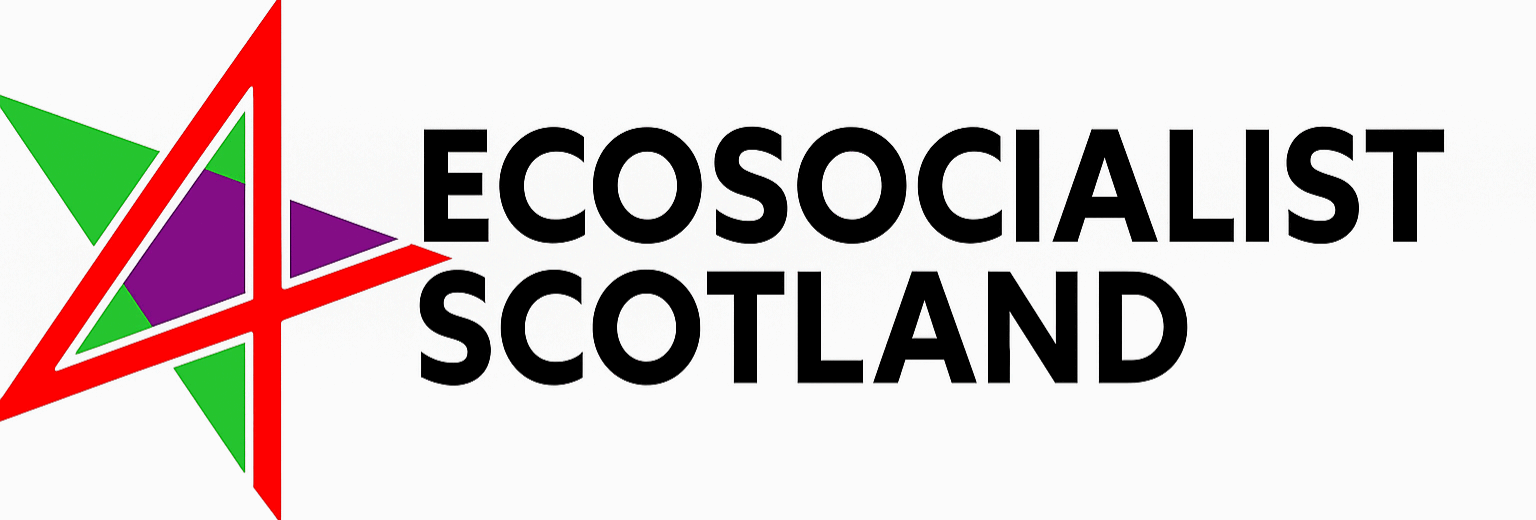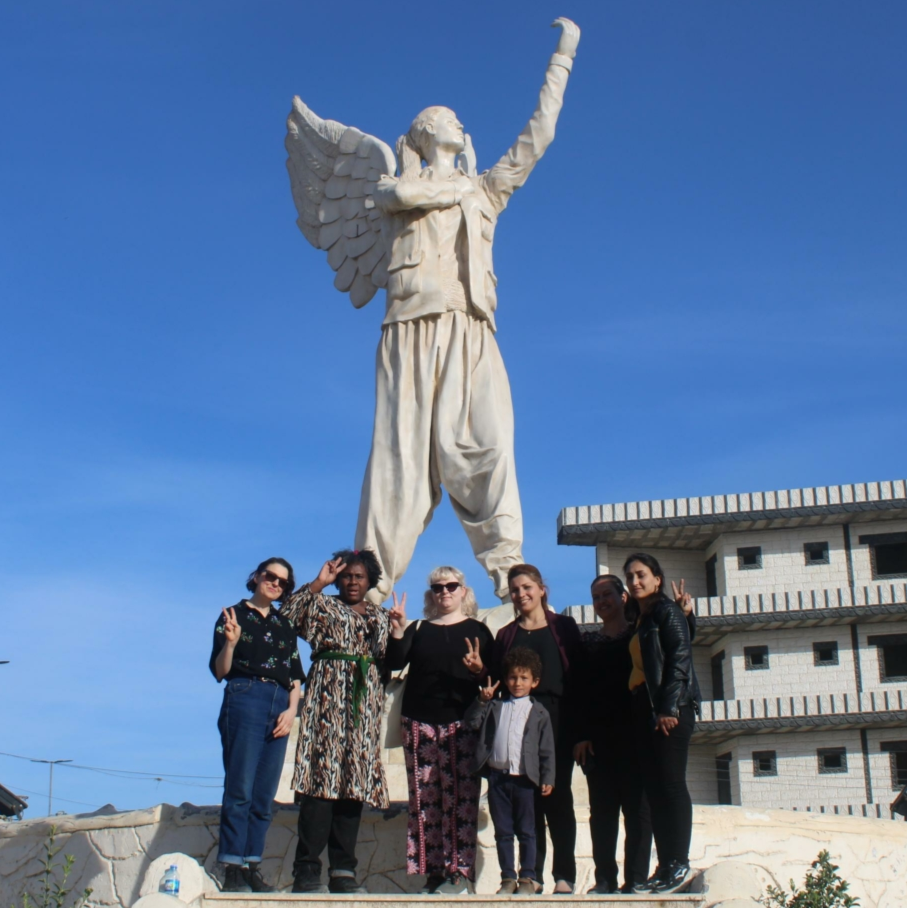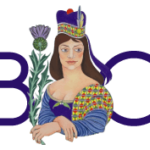On Christmas eve as bombs dropped on Palestine, Turkey began a fresh assault on Rojava, the Autonomous Administration of North and East Syria, destroying critical infrastructure, like power plants and grain storage, and killing civilians. Like Palestine, the ongoing struggle in Rojava is a decades (if not centuries) long fight for collective liberation and self-determination. The ongoing revolution has established a region-wide system of grassroots democracy led by women’s liberation. Such liberatory realities will always be a threat to established power structures and the most recent escalation is no coincidence. Turkey’s president Tayip Erdogan has already made two full ground invasions of Rojava, annexing the Afrin region in 2018, and Serekaniye in 2019. Now, he undertakes another aggression knowing that attention is elsewhere. As the events of the past few months have made visible the necessity and reality of anti-imperial struggle for so many, a group of women from Scotland who visited Rojava in 2023 reflect on the lessons from what they witnessed there for anyone interested in anti-colonial movements.
Why did we go?
We travelled to Rojava in spring 2023, where we met with women’s groups under the umbrella of the confederal women’s organisation, Kongra Star. We are all organisers or activists at home, with diverse backgrounds both culturally and in struggle: such as migrant justice, feminism, anti-capitalism and campaigns against the arms trade. In different ways, we could all see ourselves reflected in the struggle and the achievements of the Rojava revolution. We all have questions, now more than ever, about how we can change the world we live in for the better, and we felt we could learn a lot from the political process there.
The Kurdistan Freedom Movement has a tradition of grassroots organising and challenging oppressive power structures instead of recreating them. The revolution has followed this philosophy, not basing the organisation of society on nationalist or ethnic lines. Kurds, Arabs, Syriacs, Ezidis and all the people of the region self-organise and develop their own strengths, coming together in structures that treats diversity as strength. Together they have created the Autonomous Administration of North and East Syria and are transforming their society at all levels. The philosophy of Abdullah Öcalan, with its proposals for Democratic Confederalism (the organisation of society through democratic self-organisation not state institutions) and women’s liberation, is the beating heart of a revolution which has been going on for over a decade. Kurdish women had been organising for many years when opportunity for revolution arose in 2012, at which point the people of Rojava, because of this committed long-term work of organising and education, were prepared to build up a society based on women’s freedom and gender liberation, pluralism, ecology, grassroots democracy and self-governance.
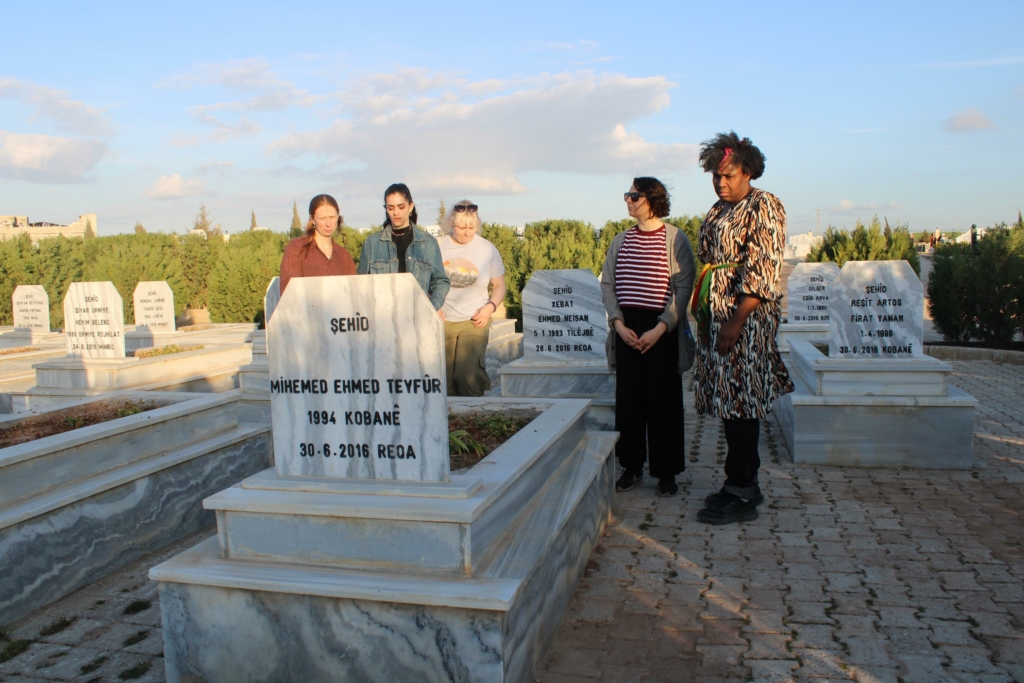
What was our experience there?
It was one thing to read about it all and another to see it – and in just under two weeks, there was a lot to see. We clambered in and out of cars several times a day, bouncing on dusty uneven roads to one meeting after another. We filed in and out of offices, halls, yards and canvas tents, to sit on plastic chairs, colourful sofas, or cushions on the floor. We met with dozens of organisers, most of them women, who explained their stories to us with a dignity and a sense of self that was awe-inspiring. They patiently answered our questions as we hungrily tried to imprint everything on our memories. In between meetings, we were hosted in family homes, fed more than we could eat, and made friends despite language and cultural barriers.
On our first day, we visited a Jineoloji Academy, Washokani refugee camp and Jinwar village. We learnt about the work and research of Jineoloji in the first meeting: it is a science of life, society, and the creation of a new world based on women’s and ecological liberation. The aim of their analysis of oppression is to solve social problems, rather than merely theorise about them. In our discussion, we compared the Western rhetoric of “rights” to the concept of “freedom” in Rojava. In our organising in Scotland, we often come across tendencies to rely on governance structure to grant rights and solutions – e.g. by lobbying for laws or asking for grants. Freedom, as the women from the Jineoloji Academy explained to us, consists in autonomy and self-empowerment. It needs to be built from the ground up and cannot be granted from above. This encouragement of the flourishing of autonomy through collective action showed us how Rojava is a microcosm of all the world’s social problems and provides inspiration for women’s struggles in Scotland as well.
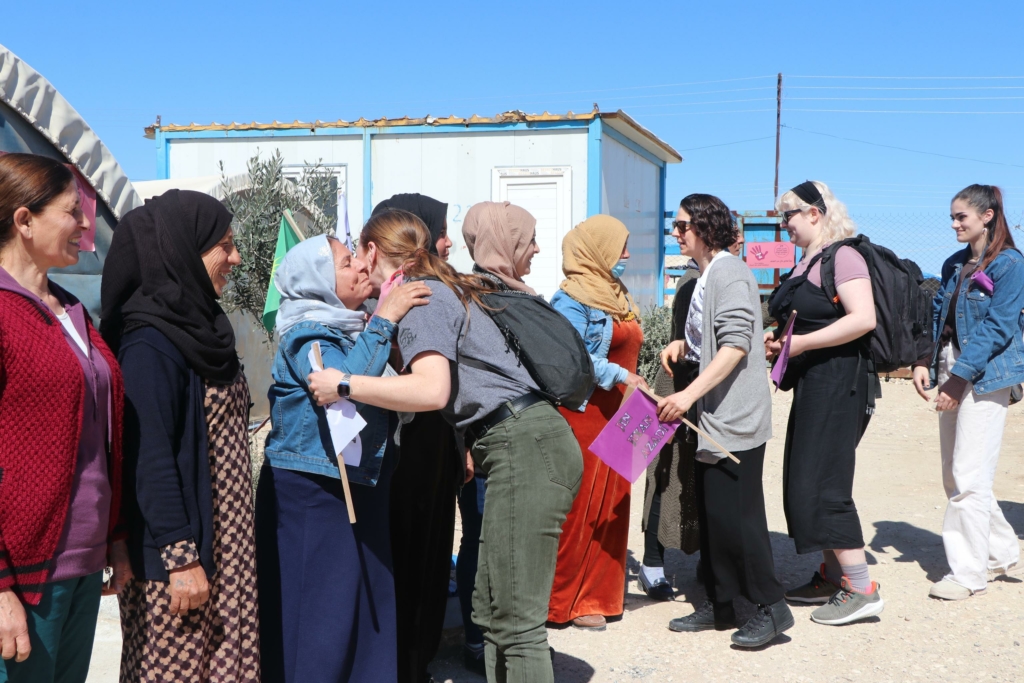
When we visited the Washokani refugee camp, we spoke to the women’s group there. The inhabitants of the camp were displaced by Turkey’s 2019 invasion of Serekanye, and their aim is to return to their homes. In the meantime, despite the difficulties of living in a camp with a shortage of basic necessities and no support from international NGOs, they are also autonomously organised as women. The camp is run through collective decision-making with a system of communes and assemblies, and their group makes sure women’s voices are heard. We saw that Heyva Sor, the Kurdish Red Crescent, had a strong presence on site, as the only group providing medical support. As we were leaving the camp, we passed a group of children flying kites made from plastic bags and playing ball – we had no choice but to join in, moved by their commitment to joy and life during a time of displacement and war.
The women-led aspect of the revolution goes beyond autonomous women’s organising and encompasses the liberation of children and families as well. At Jinwar Women’s Village, which started 6 years ago as one of the only women’s villages in the world, we learnt about how they also organise a regular children’s assembly. Its purpose is to extend democracy to the youth by encouraging them to self-organise, solve their problems, and share skills, ideas and culture. The village also embraces herbal medicine and deepens the connection to the land through growing their own food; a testament to the administration’s aims of caring for the environment and sustainability. After the discussion, we shared a delicious meal made with local nutritious ingredients, and it was easy to agree with the following message, voiced earlier in the day by one of the village’s inhabitants: “Women are the heart and driving force of democracy – when we come together and feel together, no one can defeat us”.
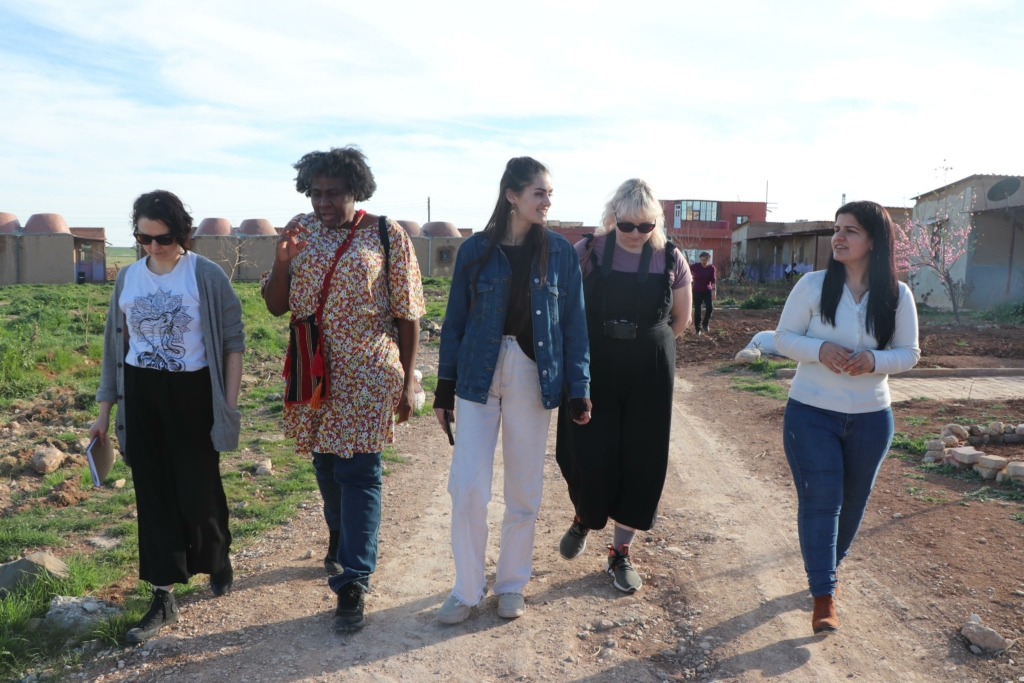
We had all these experiences in just one day and met with many more dedicated revolutionaries over the course of the delegation; women organising to end gendered violence through transformative justice, women’s workers’ co-operatives working on economical sustainability, neighbourhood assemblies, councils and offices in different regions, groups supporting disabled people, and women’s self-defence forces like HPC-Jin (Women’s Neighourhood Defence Forces) and YPJ (Women’s Defence Units).
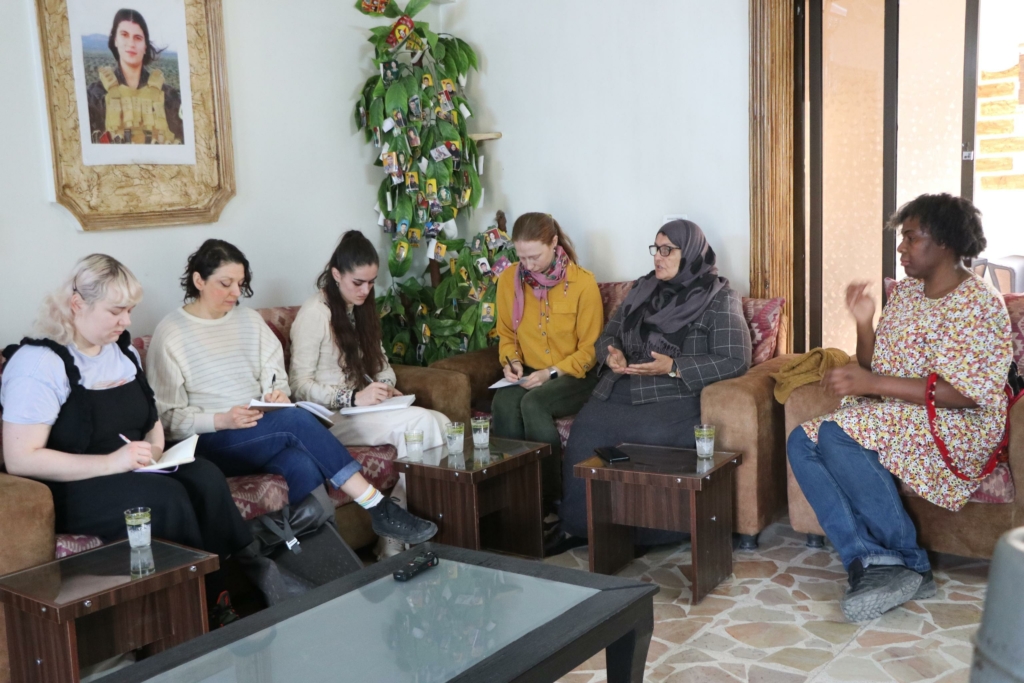
Messages to Scotland and learnings for us
It was clear how much we were learning and what we were getting out of the experience. We had to ask ourselves what they felt they were getting out of giving us so much time from their busy lives. Usually, the answer came in the form of a smile and asking us to build our own revolution at home. We shuffled awkwardly, asking if there were key messages, they wanted us to bring out to the world, while we work on that one.
Spreading the word about the revolution, and the Turkish state’s attempts to destroy it is a start. Rojava is a living example of how we can organise ourselves and society differently. It is direct democracy, with women involved at every level of organising, a new society with communal living at the centre. It is messy, imperfect, and still not complete – but it shows it is possible. At a time when it is hard to find any light, we must hold onto and know that a better world is possible.
The women of North and East Syria are not asking for anyone’s help and are more than capable of changing their own world. Still, we were reminded many times of the UK’s responsibility in the arms trade that leads to the bombs dropping on Rojava, and the complicity of global powers in the Turkish state’s attacks on infrastructure. The neighbourhood communes and assemblies there lamented the shortages of water and resources, which are problems with material roots in the UK. For example, BAE systems – who have multiple sites in Scotland – are helping Turkey develop their own aircraft.
In addition to drone strikes and shelling of infrastructure, Turkey also targets political organisers, particularly women. We have already looked on, horrified, as Yusra Darwish, a friend who welcomed us with tea and discussed neighbourhood organising with us, was killed in a Turkish drone strike in June. Now we are watching as power stations, water supplies, hospitals and even the region’s only oxygen factory, are targeted in an effort to break the will and the ability to survive of the people of the region. The fabric of everything that made such an impression on us, that has become an inspiration for radicals all over the world, is under attack.
Call to Action
States that destroy infrastructure, kill civilians and deny people the right self-determination are a threat to democracy and liberation everywhere. And if we believe in a fairer, just world for everyone, then we need to stand up and fight against it. We can start by breaking the silence. Share your knowledge of these attacks with your friends, discuss it with your family, and post about it online. Follow news sites like the ones detailed below.
You can also donate to Heyva Sor a Kurd (Kurdish Red Crescent) who are on the ground in North-East Syria providing vital humanitarian and medical assistance (details at end).
Lastly, join, support, or set up a local solidarity group, such as the Kurdistan Solidarity Network or Scottish Solidarity with Kurdistan.
Stay up to date on events in the region:
ANF News (https://anfenglishmobile.com/ ) or Medya News (https://medyanews.net/ ). As well as groups such as the Rojava Information Centre (Twitter: @RojavaIC ) or Riseup 4 Rojava (https://riseup4rojava.org/ ).
Solidarity networks:
Scottish Solidarity with Kurdistan | Facebook Look on Facebook: “ScottishSolidaritywithKurdistan”
DONATE TO HEYVA SOR HERE
Bank account
Heyva Sor a Kurdistanê e. V.
Kreissparkasse Köln
IBAN: DE49 3705 0299 0004 0104 81
BIC/SWIFT: COKSDE33XXX
Reference: Rojava
PayPal: paypal.me/heyvasorakurdistane
Contact and further information: www.heyvasor.com
E-Mail: heyvasor@web.de
Phone: +49 (0) 2241 975 25 83
Instagram: heyvasor
Twitter: @Heyva__Sor
Facebook: Heyva Sor a Kurdistanê e.V.
Originally published 7 January 2024 on Bella Caledonia: https://bellacaledonia.org.uk/2024/01/07/womens-delegation-from-scotland-to-rojava/
Main Picture: Arin Mirkan square in liberated Kobane, pivotal in the fight against ISIS. Photo Credit: Jennifer Clapham
